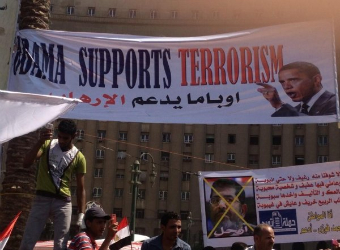There is little that the angry supporters of the Muslim Brotherhood have in common with the secular, liberal revelers in Tahrir Square these days — except for one thing.
They both believe the U.S. government is conspiring against them.
After a year of outreach to the Muslim Brotherhood following the election of its candidate, Mohamed Morsi, as president, the United States is widely perceived here as siding with Islamists it once eyed with distrust.
At the same time, the Obama administration’s cautious refusal to condemn Morsi’s ouster last week quickly spent the goodwill it had built with the Brotherhood — without buying any trust from the other side.
Instead, the liberal forces who drove the revolution to topple Morsi view the United States with even more wariness.
“We love the American people,” said Bolis Victor, 34, a middle-class merchant in the Egyptian capital, who said he has relatives in Chicago. “But we hate Obama and Patterson.”
That would be U.S. Ambassador to Egypt Anne W. Patterson, a career diplomat who assumed the top post in Cairo in 2011.
“She needs to pack her bags. She needs to go home. We hate her more than Morsi himself, and that is something very remarkable,” Victor said.
As he spoke Tuesday in Tahrir Square, everyone around him nodded their heads in agreement: They hated her, too.
The businessman and his friends were savoring their revolutionary victory, “the popular uprising, aided by the Egyptian army,” as he put it, that forced Morsi from office. And they were sitting under a banner in Tahrir Square that read: “Obama loves terrorists.”
In Tahrir Square these days, “terrorists” is the shorthand used by some for the Muslim Brotherhood.
After Morsi’s victory last June, the United States offered support of the country’s nascent democratic process and its first democratically elected leader. In the fall, the U.S. embassy hosted a high-level delegation of business leaders in an effort to promote investment. During the conflict between Israel and the Gaza Strip, Americans leaned heavily on Egypt to help broker a truce.
But while the U.S. government has rarely been popular on the Arab street, the anti-American vibe among the anti-Morsi crowds in Cairo in recent weeks has been especially pronounced.
Some of the accusations against the Obama administration are beloved chestnuts — how the U.S. government and its ally Israel are plotting to steal Egypt’s Sinai Peninsula.
But many of the grievances are of a more recent vintage. Opponents of the Muslim Brotherhood note that just days before Morsi was toppled by the generals who say they were responding to popular will, the U.S. ambassador gave an unusually candid speech that many here said was an effort to keep them at home.
“Some say that street action will produce better results than elections. To be honest, my government and I are deeply skeptical,” Patterson said in Cairo on June 18, attempting to explain more broadly the U.S. determination to work with any democratically elected government of Egypt.
Source: The Washington Post


